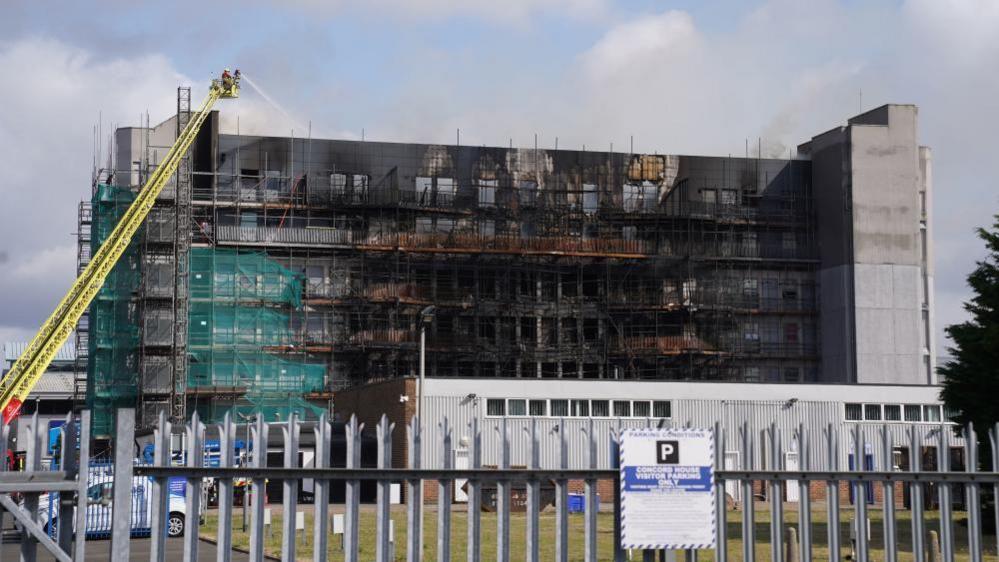Bride-to-be lost wedding dress in tower block fire
Lukasz and Agnieszka say they "don't know what to do" ahead of their wedding day in two weeks
- Published
A couple's wedding day is in jeopardy after they "lost everything", including the bride-to-be's wedding dress, in the Dagenham tower block fire.
Lukasz and Agnieszka say they are "devastated because that was supposed to be our best day of our lives, but everything has just got burnt down in the building".
They had collected Agnieszka's wedding dress just two days before fire ripped through their block of flats in east London on Monday.
The couple said they were alerted to the blaze by neighbours at about 03:00 BST after not hearing a fire alarm, adding that they managed to escape the building despite their nearest fire escape being "totally locked".
Speaking to BBC News outside a rest area for evacuated residents at a nearby leisure centre, Lukasz said they were now homeless and had "nothing left".
"We don’t know what to say, it’s hard to say anything in our situation," he said. "Basically we’ve got nothing left."
The couple have been accommodated in a hotel for two nights following the fire but "don't know" what they will do next.
Lukasz added that the couple have "no money" after spending a significant amount on their wedding day, due to take place in two weeks, including taking out loans to cover the cost.
The wedding dress cost £2,500, he said.
'We somehow got out' of London tower inferno
- Published27 August 2024
Replacing cladding needs urgent action, adviser says
- Published27 August 2024
About 225 firefighters were sent to the blaze in Freshwater Road at 02:45 BST as the fire took hold in the building, including the scaffolding around it and the roof.
More than 80 people were evacuated and two were taken to hospital. London Fire Brigade (LFB) said that all of the building's occupants were accounted for.
A major incident was declared by the fire service. It has now been stood down but crews will remain at the scene on Tuesday, the LFB said.
The building has a number of fire safety issues that are known to LFB, and questions about the role of cladding in the fire will form part of the full investigation into the incident, London Fire Assistant Commissioner Patrick Goulbourne said.
Lukasz said there were "a lot of concerns with the building", and added that neither he or Agnieszka heard a fire alarm when the blaze broke out on Monday.
He said: "We were living on the second floor, the last flat, on the end of the building and there is one fire escape directly under us but it was closed, it was locked, totally locked so we couldn’t escape that way. We had to go all the way around the building.
“We came out, we saw the smoke, we just ran out. We couldn’t even breathe normally when we ran out.
"When we came out the building there was fire blasting out of the roof."
Agnieszka added: "Everyone was running, panicking, knocking, shouting to wake up everyone. Everyone was scared."

Fire crews remained at the scene on Tuesday, but a major incident was stood down on Monday
It is not yet known what caused the fire, but according to a Facebook post from a contractor, external the building's "non-compliant" cladding was in the process of being removed.
A planning application also details "remedial" work being undertaken to remove and replace "non-compliant cladding" on the fifth and sixth floors containing flats.
The Fire Brigades Union (FBU) said the incident exposed the "'national scandal' of flammable cladding and deregulation in the building industry" and called for an "urgent and swift investigation" into the fire.
Grenfell United - a campaign group set up to support survivors and bereaved families following the Grenfell Tower fire in 2017 - said the Dagenham fire highlighted "a lack of urgency for building safety", in a statement published on social media.
The group said the fact that the building had a number of fire safety issues "highlights the painfully slow progress of remediation across the country" and called on the government to speed up the process.
In 2022, the government introduced the Building Safety Act - in response to the Grenfell Tower fire that killed 72 people in west London - making sure most leasehold owners of flats were protected from the costs of dangerous cladding.
The government also introduced a scheme forcing developers and social landlords to take steps to replace unsafe cladding, or risk facing being banned from building residential properties in England.
According to government figures published last week, 4,630 residential buildings measuring 11m and over in height have been identified as having unsafe cladding as of the end of July this year.
Half of these buildings have started or completed works to remove the cladding. Only 29% of these buildings have finished remediation works.
A final report on the Grenfell Tower Inquiry is due to be released next week.